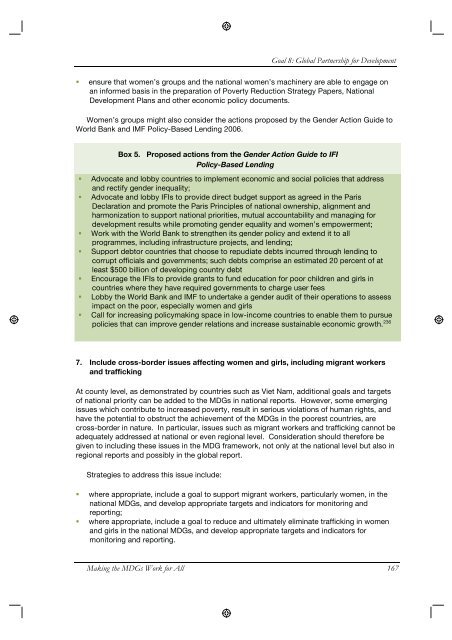Goal 8 - CEDAW Southeast Asia
Goal 8 - CEDAW Southeast Asia
Goal 8 - CEDAW Southeast Asia
Create successful ePaper yourself
Turn your PDF publications into a flip-book with our unique Google optimized e-Paper software.
<strong>Goal</strong> 8: Global Partnership for Development<br />
ensure that women’s groups and the national women’s machinery are able to engage on<br />
an informed basis in the preparation of Poverty Reduction Strategy Papers, National<br />
Development Plans and other economic policy documents.<br />
Women’s groups might also consider the actions proposed by the Gender Action Guide to<br />
World Bank and IMF Policy-Based Lending 2006.<br />
Box 5. Proposed actions from the Gender Action Guide to IFI<br />
Policy-Based Lending<br />
Advocate and lobby countries to implement economic and social policies that address<br />
and rectify gender inequality;<br />
Advocate and lobby IFIs to provide direct budget support as agreed in the Paris<br />
Declaration and promote the Paris Principles of national ownership, alignment and<br />
harmonization to support national priorities, mutual accountability and managing for<br />
development results while promoting gender equality and women’s empowerment;<br />
Work with the World Bank to strengthen its gender policy and extend it to all<br />
programmes, including infrastructure projects, and lending;<br />
Support debtor countries that choose to repudiate debts incurred through lending to<br />
corrupt officials and governments; such debts comprise an estimated 20 percent of at<br />
least $500 billion of developing country debt<br />
Encourage the IFIs to provide grants to fund education for poor children and girls in<br />
countries where they have required governments to charge user fees<br />
Lobby the World Bank and IMF to undertake a gender audit of their operations to assess<br />
impact on the poor, especially women and girls<br />
Call for increasing policymaking space in low-income countries to enable them to pursue<br />
policies that can improve gender relations and increase sustainable economic growth. 236<br />
7. Include cross-border issues affecting women and girls, including migrant workers<br />
and trafficking<br />
At county level, as demonstrated by countries such as Viet Nam, additional goals and targets<br />
of national priority can be added to the MDGs in national reports. However, some emerging<br />
issues which contribute to increased poverty, result in serious violations of human rights, and<br />
have the potential to obstruct the achievement of the MDGs in the poorest countries, are<br />
cross-border in nature. In particular, issues such as migrant workers and trafficking cannot be<br />
adequately addressed at national or even regional level. Consideration should therefore be<br />
given to including these issues in the MDG framework, not only at the national level but also in<br />
regional reports and possibly in the global report.<br />
Strategies to address this issue include:<br />
where appropriate, include a goal to support migrant workers, particularly women, in the<br />
national MDGs, and develop appropriate targets and indicators for monitoring and<br />
reporting;<br />
where appropriate, include a goal to reduce and ultimately eliminate trafficking in women<br />
and girls in the national MDGs, and develop appropriate targets and indicators for<br />
monitoring and reporting.<br />
Making the MDGs Work for All 167

















